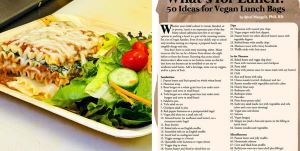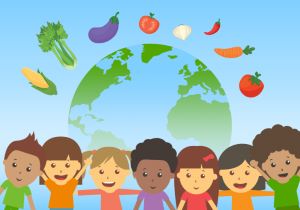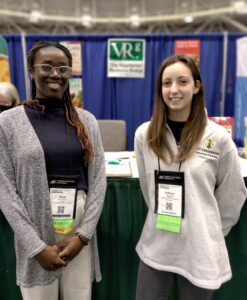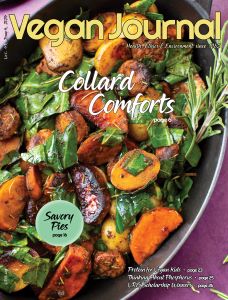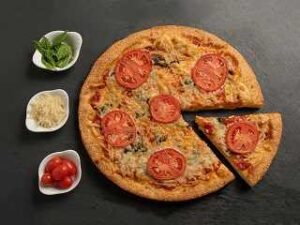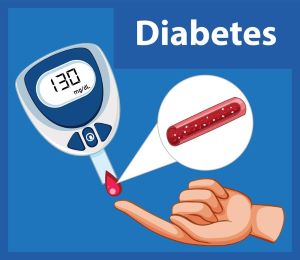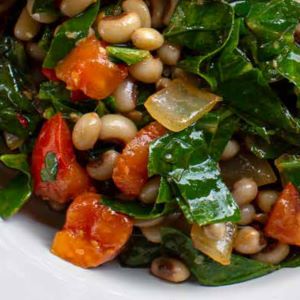Protein for Vegan Children
Ever wonder how much protein children need? In the latest issue of Vegan Journal, Reed Mangels, PhD, RD, gives examples of how much protein is found in a portion of vegan foods children consume. Read the entire article here: https://www.vrg.org/journal/vj2024issue4/2024_issue4_protein_vegan_children.php
To subscribe to Vegan Journal in the USA only, visit: https://www.vrg.org/member/
Date Better Snacks
Anyone with a sweet tooth will fall in love with Date Better snacks which consist of dark chocolate-covered Medjool dates stuffed with creamy nut butter. Read our review in Vegan Journal: https://www.vrg.org/journal/vj2024issue4/2024_issue4_veggie_bits.php
To subscribe to Vegan Journal in the USA only, visit: https://www.vrg.org/member/
VRG INTERN ATTENDS FNCE ANNUAL MEETING OF THE ACADEMY OF NUTRITION AND DIETETICS
By Akua Oppong
I had the pleasure of attending the Food and Nutrition Conference and Expo (FNCE) with The Vegetarian Resource Group in Minneapolis, Minnesota. FNCE is a yearly conference that hosts dietitians, nutrition professionals, food companies, and organizations to discuss progress in the nutrition and food community, network, and brainstorm new ideas. My experience was memorable, offering professional insights and personal growth. When I first got there on Saturday, we went to where the expo was being held and I helped set up the VRG booth, which gave me a behind-the-scenes view of exhibiting. The VRG staff shared valuable tips on setup and strategy, and as we explored the expo hall, they pointed out the rise of vegan food companies attending over the years. This growth was exciting to hear about as it demonstrated the increasing mainstream interest in vegan nutrition.
Networking was a highlight, especially at the First-Time Attendee Reception. I met dietitians working across various fields, including Head Start and Sodexo, which reminded me of the diversity of nutrition careers. The reception’s friendly atmosphere eased me into the conference, preparing me to continue having insightful conversations with people.
Later that afternoon I attended the opening session, which was impactful as I listened to a speech by Livleen Gill and Dr. Evelyn Crayton, current and former presidents of the Academy of Nutrition and Dietetics (AND). They both shared their inspiring journeys including how Dr. Crayton started from “humble beginnings” and was able to push boundaries to become the Academy’s first African American president. Her speech was electrifying and hopeful and could be felt around the room as people cheered for her. Livleen Gill shared her story about how she grew up in India, unexpectedly became interested in nutrition, loved it, and became a registered dietitian. She also expressed the widespread sentiment among dietitians that more work should be done for them to be respected in the health field, and for them to be primary sources of information for nutrition, as a lot of misinformation spreads on the internet and among other health professionals. Dr. Rishi Manchanda, the keynote speaker, talked about health equity. He explained the public health parable and the significance of addressing upstream issues like food insecurity before they become downstream health problems that are harder to fix, such as diabetes and heart disease. It was nice to see how nutrition was incorporated with public health, as it is a powerful tool for preventing and reversing disease. I also got a nice review of core public health principles as a public health student.
In between sessions and helping at the VRG booth, I had the chance to sample various vegan foods at the expo, such as California strawberries and LightLife’s tempeh, which they used to make a flavorful vegan tuna salad. I also got to sample Beyond Burger’s vegan avocado oil burgers made with their new formula with natural ingredients such as yellow pea protein, brown rice protein, and red lentil protein (beyondmeat.com). It was interesting to see how they took consumer’s feedback to create a healthier burger with more whole-food ingredients. I also got to try some delicious vegan muffins, popsicles, and yogurt from Red Plate Foods, Good Pop, and Nature’s Fynd. The Red Plate Foods muffins were satisfyingly rich and decadent. GoodPop’s dairy-free orange popsicle was nice to have as a cool and refreshing treat as I walked around the expo, and Nature Fynd’s yogurt was especially interesting as it is fungi-based, made using fungi from Yellowstone National Park (naturesfynd.com). It was exciting to try a vegan yogurt with a significant amount of protein (8 grams) that is still smooth and creamy.
As I browsed through the tables at the expo, I came across the Physicians Committee for Responsible Medicine (PCRM), a nonprofit I learned about at an event called Planet Maryland that I attended with Nadely, another VRG intern, during my Vegetarian Resource Group internship in the summer. From PCRM, I got ahold of some great resources to take with me, such as the African Heritage Power Plate, a vegan guide for traditional African foods. I was excited to see this as I am also interested in teaching people in the African community that they can eat healthily and vegan using their traditional foods.
On Sunday, I looked at some interesting poster presentations and attended a session by Reed Mangels PhD, RD, VRG’s Nutrition Advisor. Her presentation was called “Exploring the Rewards and Challenges of Vegetarian Diets: A Fresh Look at the Academy’s Position (on veg diets). That evening, I attended the National Organization of Blacks in Dietetics and Nutrition (NOBIDAN) meet and greet reception. I am very happy that I was able to squeeze this in because I ended up sitting at a table with a dietetics student who I told about my interest in promoting vegan nutrition among the African community, and she told me about an organization called Women Advancing Nutrition, Dietetics, and Agriculture (WANDA). I am very grateful that I talked to her and she told me about this organization because after that I researched WANDA some more and found out about a conference they were having in DC that I was able to attend.
Later that evening, I went to a vegan dinner that VRG hosted at Sawatdee, a Thai restaurant. A variety of people that VRG has worked with and conference attendees from the Vegetarian Nutrition Dietetic Practice Group were there including students and dietitians. The food was delicious, including peanut tofu curry, noodles, rainbow spring rolls, mock duck, and brown rice. I was especially excited to fly to Minnesota so I could have the mango sticky rice that I saw on the menu. I first tried it at the Planet Maryland event I attended in Bethesda, and was eager to try it again. It definitely did not disappoint and I was happy to take some leftovers with me. Interestingly, the peanut tofu curry tasted exactly like the Ghanaian peanut soup I eat at home with tofu. Everyone at the dinner was very inviting, and I met many great people who expressed their passion for veganism and talked about their experiences including advocacy efforts. I had the chance to introduce myself and talk about the vegan Ghanaian meal plan and recipes I did with Reed during my internship, and they all seemed excited to talk to me about them.
Attending FNCE reinforced my desire to continue my education and consider graduate programs in public health and nutrition. I left feeling inspired and excited about my journey ahead. I am very grateful for the encouragement from everyone I met, including The Vegetarian Resource Group. I cannot thank them enough for all of the support they have provided me over the past few months, as they recognize my goals and passions and help me strive towards them. Thank you VRG! It has been a blessing to be part of such a nurturing organization.
For information about VRG internships, see www.vrg.org/student/index.php
To support VRG internships and outreach, please donate at www.vrg.org/donate
Scientific Updates from Vegan Journal
Each issue of Vegan Journal includes a column called “Scientific Update” written by Reed Mangels PhD, RD. In the latest issue we cover the topics Plant-Based Diets and Risk of Hip Fracture, as well as Plant-Based Diets After a Diagnosis of Prostate Cancer Are Associated with a Lower Risk of Progression. Read these scientific paper reviews here: https://www.vrg.org/journal/vj2024issue4/2024_issue4_scientific_update.php
To subscribe to Vegan Journal in the USA only, visit: https://www.vrg.org/member/
SARPINO’S PIZZERIA OFFERS VEGAN OPTIONS
Sarpino’s has stores in nine states and offers a multitude of vegan pizzas. such as pepperoni and spiced chicken. Other vegan options include vegan garlic bread, vegan cheesy bread, vegan calzone, vegan chicken tenders, and vegan cheesecake. See https://pompano-beach.gosarpinos.com/ordering/menu/Vegan%20Options
The contents of this posting, our website and our other publications, including Vegan Journal, are not intended to provide personal medical advice. Medical advice should be obtained from a qualified health professional. We often depend on product and ingredient information from company statements. It is impossible to be 100% sure about a statement, info can change, people have different views, and mistakes can be made. Please use your best judgment about whether a product is suitable for you. To be sure, do further research or confirmation on your own.
Cynthia King: Vegan Dancer and Ballet Shoe Entrepreneur
In the latest Vegan Action column in Vegan Journal, Keryl Cryer highlights the accomplishments of Cynthia King. Cynthia founded her Brooklyn, New York, dance studio in 2002 and parents asked which dance shoes she would recommend. At the time, there weren’t any cruelty-free and affordable options and she decided to create her own. Read the entire article here: https://www.vrg.org/journal/vj2024issue4/2024_issue4_vegan_action.php
To subscribe to Vegan Journal in the USA only, visit: https://www.vrg.org/member/
Managing Type 2 Diabetes
by Reed Mangels, PhD, RD
According to the Centers for Disease Control and Prevention (CDC) about 1 in 10 Americans have diabetes; most of these people have type 2 diabetes. Type 2 diabetes is associated with health complications including eye disease, foot problems, heart disease, stroke, nerve problems, and kidney disease. Treatment usually involves lifestyle changes and possibly medications.
A recent study that I was involved with examined previously published studies of use of vegetarian, including vegan, diets in treatment of type 2 diabetes (1). We evaluated and summarized seven studies that had been done on this topic.
One of our most interesting results was that in adults with type 2 diabetes who were placed on a vegan diet, their hemoglobin A1C decreased more than it did in adults with type 2 diabetes who were on a nonvegetarian diet. Hemoglobin A1C is determined by a blood test and it indicates what your average blood sugar levels are. The magnitude of the decrease in hemoglobin A1C seen in those on a vegan diet is clinically relevant. A vegan diet was also associated with a decrease in body mass index (BMI). Use of vegetarian, including vegan, diets appeared to be associated with a lower requirement for diabetes medications.
We concluded, based on our results, that vegetarian or vegan dietary patterns should be presented as an option in nutrition care plans for adults with type 2 diabetes. Several organizations including the European Association for the Study of Diabetes (2) and Diabetes Canada (3) support the use of vegetarian/vegan diets to manage type 2 diabetes.
References
- Guest NS, Raj S, Landry MJ, et al. Vegetarian and vegan dietary patterns to treat adult type 2 diabetes: A systematic review and meta-analysis of randomized controlled trials. Adv Nutr. 2024;15:100294.
- Diabetes and Nutrition Study Group (DNSG) of the European Association for the Study of Diabetes (EASD). Evidence-based European recommendations for the dietary management of diabetes. Diabetologia. 2023;66:965-985.
- Diabetes Canada Clinical Practice Guidelines Expert Committee, Sievenpiper JL, Chan CB, Dworatzek PD, Freeze C, Williams SL. Nutrition therapy. Can J Diabetes. 2018;42 Suppl 1:S64-S79.
To read more about vegetarian/vegan diets and diabetes see:
Vegan Menu for People with Diabetes
Book Review: The Plant-Powered Plan to Defeat Diabetes
Dietary Factors Associated with Type 2 Diabetes
A Vegan Diet May Reduce the Risk for Developing Type 2 Diabetes in Overweight Adults
The contents of this website and our other publications, including Vegetarian Journal and Vegan Journal, are not intended to provide personal medical advice. Medical advice should be obtained from a qualified health professional. We often depend on product and ingredient information from company statements. It is impossible to be 100% sure about a statement, info can change, people have different views, and mistakes can be made. Please use your best judgment about whether a product is suitable for you. To be sure, do further research or confirmation on your own.
Support VRG on Giving Tuesday!
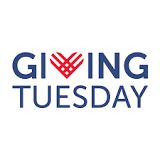 Today is Giving Tuesday. Please consider supporting all the vegan outreach that The Vegetarian Resource Group does throughout the year. Donate at www.vrg.org/donate We greatly appreciate your support!
Today is Giving Tuesday. Please consider supporting all the vegan outreach that The Vegetarian Resource Group does throughout the year. Donate at www.vrg.org/donate We greatly appreciate your support!
Cooking with Collard Greens
The latest issue of Vegan Journal includes a piece by Nava Atlas called “Collard Comforts.” Enjoy recipes for Stir-Fried Collard Greens and Cabbage; Spicy Collard Greens with Black-Eyed Peas and Tomatoes; Hoisin-Glazed Collard Greens and Sweet Potatoes; Rosemary Potatoes and Collard Greens with Vegan Sausage; and Roasted Collard Greens with Polenta and Brussels Sprouts. These delicious recipes can be found here: https://www.vrg.org/journal/vj2024issue4/2024_issue4_collard_comforts.php
To subscribe to Vegan Journal in the USA only, visit: https://www.vrg.org/member/
